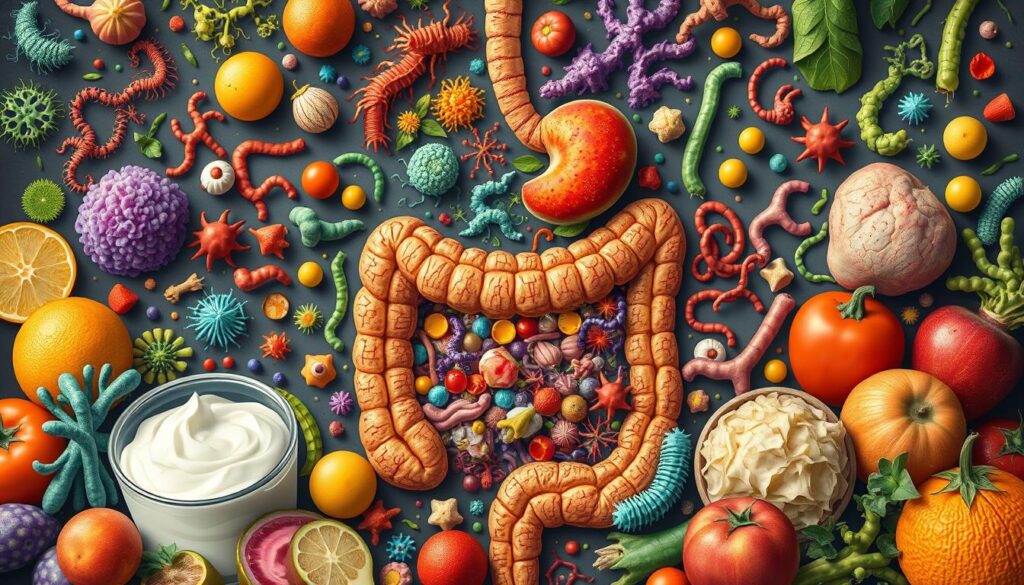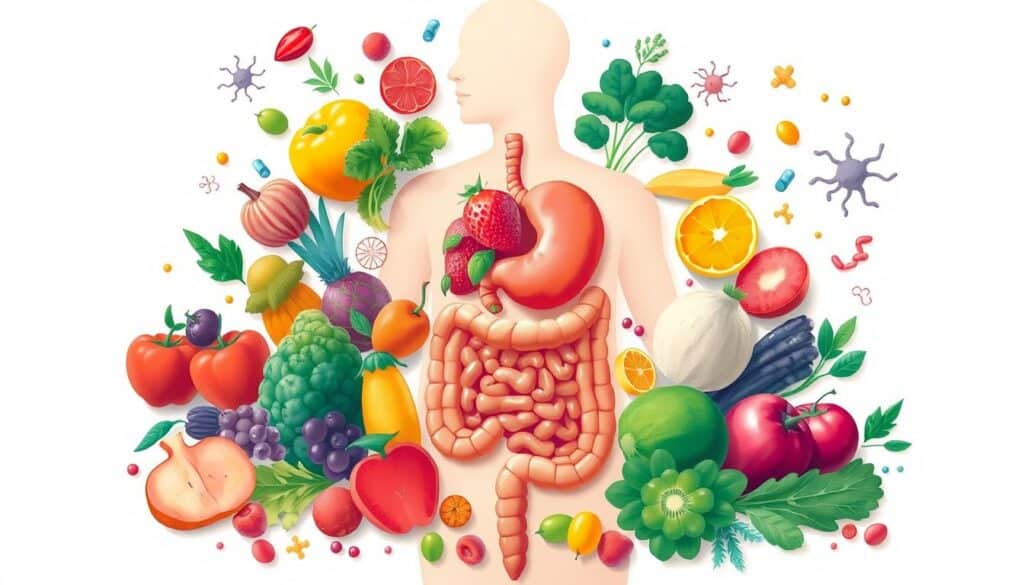Improving gut health is key for feeling good both physically and mentally. The gut is home to trillions of tiny organisms that help with immunity, digestion, and even brain function. This article shares 10 easy ways to make your gut health better. By eating foods with probiotics, fermented foods, and prebiotic fiber, managing stress, and sleeping well, you can boost your gut health. These changes can make you feel better overall.
Key Takeaways : Gut Health
- Gut health is essential for overall physical and mental well-being.
- The gut microbiome plays a crucial role in various aspects of health.
- Simple lifestyle changes can help improve gut health naturally.
- Probiotics, fermented foods, prebiotic fiber, stress management, and adequate sleep and exercise are key strategies.
- Adopting these evidence-based approaches can help cultivate a healthy gut microbiome.
What is Gut Health and Why Is It Important?
Gut health is about the balance and variety of tiny living things in our digestive system. These include bacteria, yeasts, and viruses. They are vital for our health and happiness.
The gut-brain axis links our gut and brain closely. It shows how gut health affects our mood and feelings. The gut microbiome helps make neurotransmitters like serotonin. These chemicals help control our mood, behavior, and thinking.
Gut Microbiome and Its Role in Overall Health
A healthy gut microbiome is key for many important tasks. These include:
- Boosting the immune system to fight off infections
- Helping with digestion and getting nutrients from food
- Making important vitamins and other substances
- Keeping harmful germs out and the gut lining strong
- Affecting mental health and how we think through the gut-brain axis
Keeping our gut flora diverse and balanced is key for our health. Problems with the gut microbiome can lead to many health issues. These include digestive problems, autoimmune diseases, and mental health issues.
Probiotics and Fermented Foods for Gut Health

Keeping your gut healthy is key to feeling good overall. Probiotics and fermented foods are great for a balanced gut microbiome. They add live bacteria and yeasts that are good for your digestive system.
Eating probiotic supplements or foods like yogurt, kefir, kimchi, and sauerkraut can help. These foods boost the good bacteria in your gut. Studies show that probiotics can prevent inflammation and help with gut problems.
Fermented foods are full of probiotics and have more benefits. Making foods like yogurt and sauerkraut ferment creates helpful compounds. These compounds support a healthy gut and reduce inflammation.
| Probiotic-Rich Foods | Potential Benefits |
|---|---|
| Yogurt | Supports gut health, aids digestion, and boosts immunity. |
| Kefir | Enhances gut microbiome diversity and promotes overall digestive function. |
| Kimchi | Combats gut inflammation and may help alleviate symptoms of irritable bowel syndrome (IBS). |
| Sauerkraut | Provides a natural source of probiotics and may support a healthy immune system. |
Adding probiotic-rich foods and supplements to your diet helps your gut microbiome. This supports your overall health and well-being.
Prebiotic Fiber and a Plant-Based Diet

Keeping your gut healthy is key to feeling good. Eating foods high in prebiotic fiber and following a plant-based diet helps a lot. Prebiotics are special carbs that feed the good bacteria in your gut. Foods like asparagus, bananas, onions, and whole grains are great for this.
A diet full of sugar and artificial sweeteners can harm your gut balance. The typical Western diet is often too sugary and fatty. This can mess with your gut bacteria and lead to health problems. But, eating a diet full of prebiotic fiber from plants can keep your gut healthy and full of different bacteria. This is important for good digestion, absorbing nutrients, and keeping your immune system strong.
| Prebiotic-Rich Foods | Benefits for Gut Health |
|---|---|
| Asparagus | Contains inulin, a type of prebiotic fiber that supports the growth of beneficial gut bacteria. |
| Bananas | Rich in resistant starch, which acts as a prebiotic and promotes the growth of probiotic bacteria. |
| Onions | Contains fructooligosaccharides (FOS), a type of prebiotic fiber that feeds the good bacteria in the gut. |
| Whole Grains | Provide a variety of prebiotic fibers, including beta-glucan, that nourish the gut microbiome. |
By eating more prebiotic-rich, plant-based foods, you can help keep your gut microbiome healthy. This is good for your digestion, immune system, and overall health.
Gut Health and Stress Management

Keeping a healthy gut microbiome is key for our physical and mental health. Stress, from our minds and the world around us, can upset the balance of gut bacteria.
Stress like anxiety, depression, and trauma can deeply affect our gut. Studies on animals show that stress can harm the gut’s bacteria. In people, stress from lack of sleep and a messed-up daily rhythm can also hurt gut health.
Managing stress well can protect our gut microbiome. Techniques like meditation, deep breathing, and muscle relaxation can lower stress. A healthy life, with regular exercise and good sleep, also helps with stress and gut health.
Stress and the Gut Microbiome
The gut is home to trillions of microorganisms that are vital for our health. Stress can disrupt this balance, causing problems like:
- Inflammation in the digestive system
- Changes in how we absorb nutrients and process food
- Issues with the gut-brain connection, affecting mood and thinking
Handling stress is key to keeping our gut microbiome healthy and our overall well-being strong.
| Stress Type | Impact on Gut Health |
|---|---|
| Psychological Stress | Changes the gut’s bacteria, causing inflammation and gut-brain problems. |
| Environmental Stress | Exposure to pollutants and toxins can harm gut bacteria, leading to digestive issues. |
| Sleep Deprivation | Disrupts our body clock and changes gut bacteria, affecting metabolism and immune health. |
Knowing how stress affects our gut helps us take steps to manage stress and keep our gut microbiome healthy. This supports our overall health and well-being.
“The gut is where the majority of our immune system resides, so maintaining a healthy gut microbiome is crucial for overall health and resilience to stress.”
Importance of Adequate Sleep and Exercise

Getting enough sleep and staying active is key to a healthy gut microbiome. Studies show that these habits greatly affect gut health. They help keep the gut flora diverse and balanced.
Sleep Hygiene and Physical Activity for Gut Health
Not sleeping well can harm your gut microbiome. Research says sleeping 7 hours a night and having a regular sleep schedule helps gut health. Regular exercise, like 150 minutes of moderate activity weekly, also helps. But how it works is still being studied.
Adding these habits to your life can greatly improve gut health. Good sleep and exercise support a diverse gut microbiome. This boosts your overall health, including digestion, immune function, and mental well-being.
“Adequate sleep and regular exercise are essential for maintaining a healthy gut microbiome and supporting overall well-being.”
Gut Health

Keeping your gut healthy is key for feeling good overall. The gut microbiome is full of tiny organisms that live in your digestive system. They help with digestion, boost your immune system, and prevent chronic diseases. If these tiny organisms are not balanced, it can lead to health problems like inflammatory bowel disease, metabolic issues, and autoimmune diseases.
By changing your lifestyle to support gut health, you can make your gut microbiome stronger and more diverse. This can lead to better health for your body and mind. Here are some ways to do this:
- Eat foods with probiotics and take probiotic supplements
- Eat more prebiotic fiber from fruits, veggies, and whole grains
- Manage stress to reduce inflammation in your gut
- Get enough sleep and stay active
Putting gut health first can help you stay healthy and lower your risk of chronic diseases. A healthy gut microbiome is essential for a strong body and mind.
“A healthy gut is the key to a healthy life.”
Also Read : Which Are The Best Nutritional Foods For Healthy Hair Growth?
Conclusion
Making simple changes in your life can greatly improve your gut health. By taking probiotics, eating fermented foods, and eating more prebiotic fiber, you can help your gut microbiome. These steps can lead to better digestion, a stronger immune system, and even better mental health and thinking skills.
Putting gut health first through lifestyle changes is key to staying healthy and avoiding chronic diseases. Adding foods good for your gut and reducing stress can make a big difference. Being active also helps your gut and overall well-being.
Getting to the best gut health means looking at diet, behavior, and environment together. By making these easy but important changes, you can make the most of your gut microbiome. This leads to a healthier and more lively life.
FAQs
Q: What are some signs of an unhealthy gut?
A: Signs of an unhealthy gut may include digestive issues such as bloating, gas, diarrhea, constipation, and food intolerances. Other symptoms can include fatigue, sleep disturbances, skin irritations, and increased anxiety and depression.
Q: Why is gut health important for overall health?
A: Gut health is important because it plays a crucial role in digestion, nutrient absorption, and the immune system. A healthy gut microbiome can also influence mental health and emotional well-being, impacting conditions like anxiety and depression.
Q: How can I improve my gut health?
A: You can improve your gut health by incorporating more fruits and vegetables into your diet, choosing whole grains, reducing ultra-processed foods, and considering a probiotic supplement to promote healthy gut bacteria.
Q: What foods should I avoid for better gut health?
A: To support gut health, it is advisable to limit ultra-processed foods, sugary snacks, and high-fat processed meats, as these can negatively affect your gut microbiota and alter gut function.
Q: How do gut bacteria affect my health?
A: Gut bacteria play a significant role in digestive health, immune response, and even mental health. A balanced gut microbiome, with a diverse array of healthy bacteria, is essential for optimal health and well-being.
Q: Can a healthy diet really impact my gut health?
A: Yes, a healthy diet rich in fiber, such as whole grains, fruits, and vegetables, can benefit the gut. These foods promote a healthy microbiome and support the growth of beneficial gut bugs, improving overall gut health.
Q: What are some science-backed ways to improve gut health?
A: Science-backed ways to improve gut health include consuming a variety of high-fiber foods, incorporating fermented foods into your diet, staying hydrated, and managing stress levels to support your gut microbiome.
Q: How does stress affect gut health?
A: Chronic stress can negatively impact gut health by altering the gut microbiota and leading to gastrointestinal issues. Stress management techniques such as meditation, exercise, and adequate sleep can help support a healthy gut.
Q: What is the role of the gut microbiome in mental health?
A: The gut microbiome can influence mental health through the gut-brain axis. An imbalance in gut bacteria may contribute to mood disorders like anxiety and depression, highlighting the importance of maintaining a healthy microbiome for emotional well-being.
Source Links
- https://www.medicalnewstoday.com/articles/325293
- https://ixcela.com/resources/10-surprising-lifestyle-habits-that-support-your-gut-health.html
- https://www.healthline.com/health/gut-health








Leave A Comment